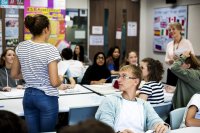Establishing a Culture of Questioning
When students consistently ask meaningful questions, they get comfortable taking the risks that lead to learning.
When students are provided consistent opportunities to develop and discuss complex questions, they’re empowered with knowledge, curiosity, and intellectual courage. We can make our classrooms places that encourage students to keep asking questions—which are the foundation of learning.
Creating a Climate for Questioning
Modeling questioning strategies that get all students involved allows students to develop confidence in their own ability to craft meaningful questions and share their responses. We also need to establish classroom procedures for respectful dialogue so that students feel safe in sharing their thinking with their peers.
I indirectly model questioning strategies by carefully considering the questions I ask. I set up the year with a few questions that are then discussed throughout the year. Through seminar discussions and reflective writing in the spring, for example, I use questions such as “How does where you live impact how you live?,” “How do humans continue to progress in a diverse world?,” and “How does constructive conversation cultivate empathy and promote participation in local and global communities?” to discuss content as well as to make connections to the world.
Students consider these questions as they participate in the Spotlight Challenge, a design thinking project I created to facilitate opportunities for students to conduct research, craft speeches, and call their peers to action. Consistently making these connections helps create a climate in which students become accustomed to questioning everything.
I also directly model strategies by sharing my metacognitive thinking as I read literature, analyze ideas, and discuss current events. I allow time to stop and share my thinking and my questions, and then invite students to share their thinking and questions as well.
I facilitate questioning by providing a low-stakes environment in which students are reassured that they don’t need to know all the answers and their participation is only used to help me determine what they need help with. They’re welcome to ask questions about questions, and are encouraged to develop questions that challenge them to consider various perspectives.
Daily Questioning
Providing daily opportunities for questioning builds confidence in students’ ability to craft their own questions. During question breaks in our literature and history units, for example, students can write down questions they have, and can also do so during verbal or digital discussions with peers.
These daily opportunities to practice questioning (and disagreeing) with each other respectfully allow students to develop the skills they need to engage in civil discourse before diving into conversations about more personal beliefs.
Core Values
There are four core values that we use from the beginning of the year. They help set up conversations to be respectful and productive.
1. Lead with facts: Use facts to back up your ideas, and hold others accountable for doing the same.
2. Disagree with compassion: When disagreeing with someone, take time to consider their point of view before responding. Use facts to explain why you disagree, and never attack anyone personally.
3. Take your time: It is always OK to pause and think about what you want to say. Don’t be uncomfortable in the silence—embrace it as an opportunity to formulate your thoughts.
4. Strive for growth: After creating, asking, and answering questions, take time to reflect on what new ideas you heard, whether anything changed your mind, what you’re curious about, etc.
Questions to Consider
Throughout each unit, students anchor their ideas with facts, practice speaking and listening skills, engage in complex conversations, and dig into subjects that interest them. I start this process by asking questions such as the ones below about literature and history. Students use these questions as examples—and also as a starting point to think about what is important when considering a situation in fiction, history, or their own lives.
- How does this situation make me feel?
- What are the various perspectives in in the situation/event/story?
- What facts support the different sides?
- What side do you agree with? Why? (Use facts to support your opinion.)
- Why might someone have a different viewpoint than you?
- How can progress be made toward improving this issue? How can you be part of the progress?
Recently my sixth-grade students studied Hammurabi’s Code. I asked them to consider whether his laws were just. When given an opportunity to ask and answer each other’s questions about this topic, they were able to see both sides of the argument and then discuss where they see injustice in the world today.
They brought up topics such as police brutality, the pay gap for women, separating immigrant children from their parents, kneeling during the national anthem, and Confederate statues in public places. Students held various viewpoints about those topics, but it was inspiring to see them honor the feelings of their classmates and ask questions to better understand the ideas of others.
Through consistent practice and opportunities to contribute meaningful questions in the classroom, all students begin to naturally and independently generate questions about what they read, hear, and encounter. As students learn to generate questions, they also discover that they have the power to inspire progress in their world.
